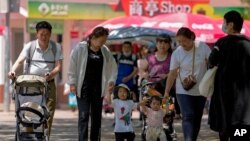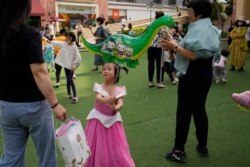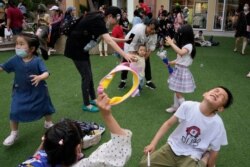"Three kids? I don't think it matters if they say I could have 100 kids. For me, one is more than enough," says Mrs. Sun, a 36-year-old officer worker in Beijing. She is having none of China's latest population policy change that allows married couples to have three children. She told VOA Mandarin she didn't want to reveal her full name for fear of government retaliation.
China's top leaders upped the allotment to three earlier this week. In 2016, Beijing began allowing couples to have two children, a response to the demographic time bomb triggered by the one-child policy introduced in 1980, which has resulted in an aging population and fewer workers.
Online, many people echoed Mrs. Sun's concerns. On Weibo, China's version of Twitter, the hashtag #three-child policy is here# has attracted nearly 4.3 billion views since the announcement on Monday and generated a torrent of sarcastic comments.
The takeaway is that the cost of living, the lack of quality child care options, and the cultural expectation of providing children with all possible advantages while providing parents with a comfortable retirement have combined to keep many middle-class Chinese couples from considering two children, let alone three.
Employed by a foreign-invested enterprise in Beijing, as is her husband, Mrs. Sun enjoys a combined monthly household income of about $3,570 (25,000 RMB) per month.
While that's a good household income for Beijing, where the average monthly salary was about $1,660 (11,623 RMB) in 2020, according to the online magazine The Beijinger, the Suns still feel pinched.
"My son goes to painting class, swimming class, piano class and taekwondo training every week," she said, adding that she and her husband also care for their elderly parents. Besides those costs, she said, "we have a mortgage. If we have two or three kids, who's going to take them to all these classes and who's going to pay for them?"
Forgoing the extra activities is not an option because it would put her child at a competitive disadvantage, Mrs. Sun said. Every parent she knows is trying to give their child the same kind of head start.
"If I have to take a second, or a third, maternity leave, who's going to ensure that my company would not fire me? I'm not taking that risk," she said.
Mrs. Sun, like many online commentators, places little faith in an official circular from 2019 promoting "equal employment of women." It prohibited "asking female applicants about their marriage and childbirth status, including a pregnancy test in the entry medical examination, and restricting childbirth as a condition of employment." The circular "also claims to provide increased support to female workers, including promoting the development of daycare services for infants and toddlers under three years old and improving after-school services for elementary-school and middle-school students," according to the Global Legal Monitor of the U.S. Library of Congress.
Officials announced the three-child policy at a meeting of the Politburo of the Chinese Communist Party (CCP), chaired by CCP General Secretary Xi Jinping. The May 31 meeting was focused on the aging population. Wang Wenbin, a spokesperson for China's Foreign Ministry, deflected a question about the purpose and motivation of the new policy asked at the daily May 31 briefing.
The birthrate fell for four consecutive years after Beijing abandoned the one-child policy in January 2016. In 2020, only 12 million babies were born, the lowest number since 1961.
China's National Bureau of Statistics (NBS) announced on May 11 that the population was 1.41 billion in the decade ending in 2020, its lowest growth since imposing the one-child policy. China's total fertility rate stands at 1.3 children per woman, below the rate of 2.1 needed to maintain a stable population, according to data from the Organisation for Economic Co-operation and Development.
According to the official Chinese state media outlet Xinhua News Agency, the three-child policy is aimed at averting a demographic crisis as the population ages and keeping "our advantage in human resource endowments." In about 25 years, one-third of China's population will be retirees, according to the NBS 2020 census report was released on May 11.
Bloomberg quoted Liu Li-Gang, managing director and chief China economist at Citigroup, as saying that for the three-child policy to be effective, the country will need "a comprehensive policy package ranging from tax incentives, education and housing subsidies, more generous maternity leave, universal provision of child care."
Mary Gallagher, a political science professor and director of the Center for Chinese Studies at the University of Michigan, says that the new policy will have little impact.
"Most importantly, the government should do more to regulate workplaces' common discriminatory practices toward women, especially women of child-bearing age," she told VOA via email.
Sophie Richardson, China director at Human Rights Watch, told VOA Mandarin that the policy change does not reflect an advance in woman's reproductive rights.
"There should be no restrictions on women's reproductive rights," she said in a phone interview. "It's very clear that the authorities are making this decision because they are increasingly concerned about demographics, not about giving women full authority they are entitled to."
A June 1 report by the New York-based rights group found that since the two-child policy went into effect in 2016, career women have faced more gender- and pregnancy-based discrimination when looking for a job.
According to a summary of the report Take Maternity Leave and You'll Be Replaced: China's Two-Child Policy and Workplace Gender Discrimination: "Countless job ads specify a preference or requirement for men, or for women who have already had children. Numerous women have described, on social media, to the Chinese media, or in court documents, their experiences being asked about their childbearing status during job interviews, being forced to sign contracts pledging not to get pregnant, and being demoted or fired for being pregnant." The Foreign Ministry did not respond to VOA Mandarin's request for comment on the report.
Richardson said the new three-child policy would only intensify the prejudice against women of childbearing age "because employers won't want to hire women if they are going to take maternity leave."
She called for Beijing to subsidize maternity leave and punish employers who discriminate.
"There are a whole additional series of steps that the authorities would need to take before you actually saw significant number of people willing to have a first, a second, and a third child," she added.
Xinhua's Weibo account posted a poll shortly after the policy announcement, asking "Are you ready (for three kids)?" Of 31,000 respondents, about 28,000 said they would "never consider it." Xinhua subsequently deleted the poll.
Gallagher thinks China can learn from other countries in East Asia and Europe with falling birthrates.
"It is most important to improve the social welfare system for working families, including child care, health insurance and access to quality public schools," she told VOA.
In the 1990s, Japan established family-friendly policies to address a declining birth rate. These measures included parental leave, a child care and child allowance, and subsidies in assisted reproductive technology. However, only 872,683 babies were born in Japan in 2020, the lowest level on record, and down 25,917 from a year earlier, according to Kyodo, a Japanese news agency.
Earlier this year, Tokyo began funding artificial intelligence projects to help local governments help citizens find the kind of love that leads to babies. The central government is allocating $19 million (2 billion yen), according to the BBC, quoting Agence France-Presse.
In an article published May 31, Xinhua quoted China's National Health Commission, saying that in contrast to its actions during the previous two child policy changes, the central government this time will provide support measures to encourage fertility.
"The support measures include strengthening the concept of marriage among young people … improving the quality of prenatal and postnatal care, developing universal child care services, reducing education costs, and improving maternity leave benefits to protect women's employment rights, among others."






